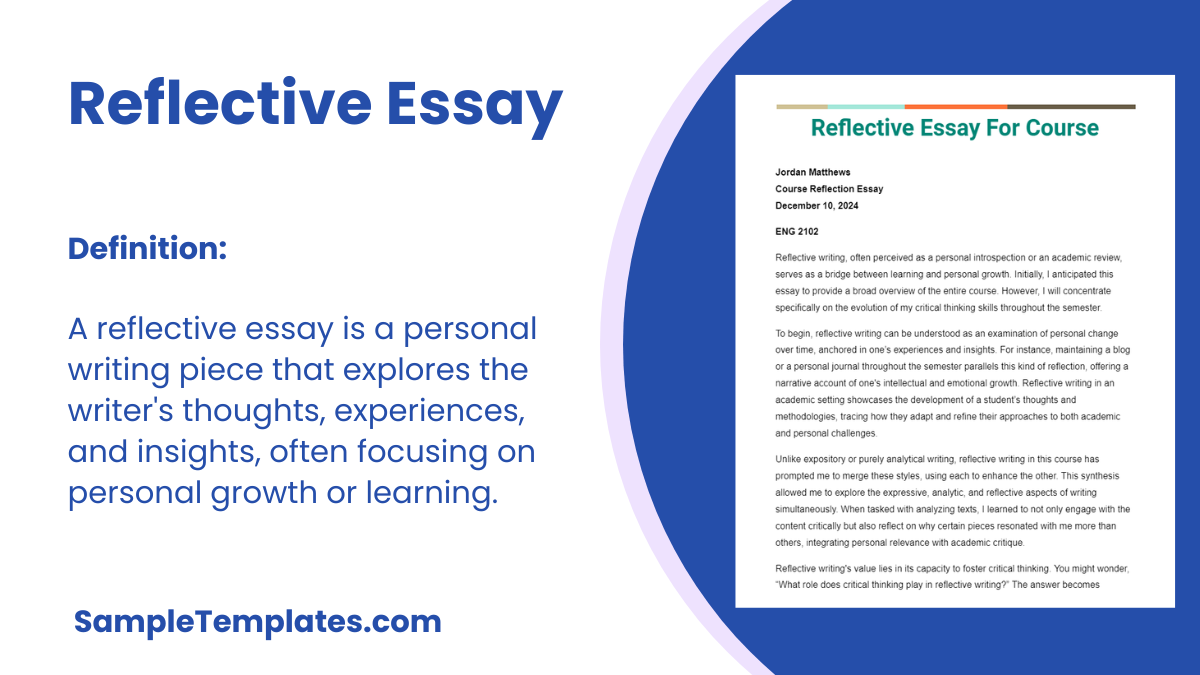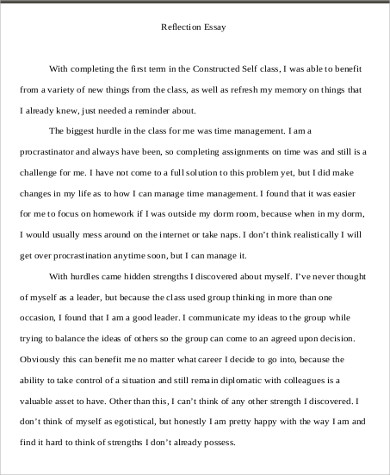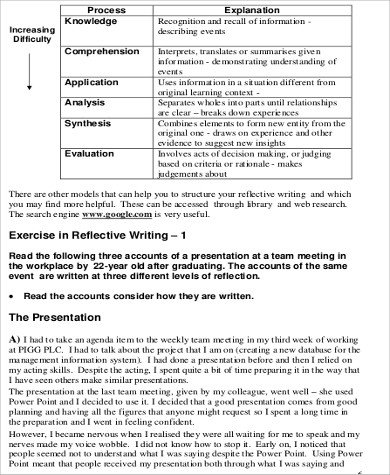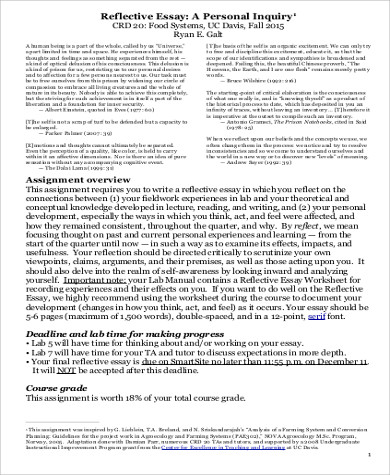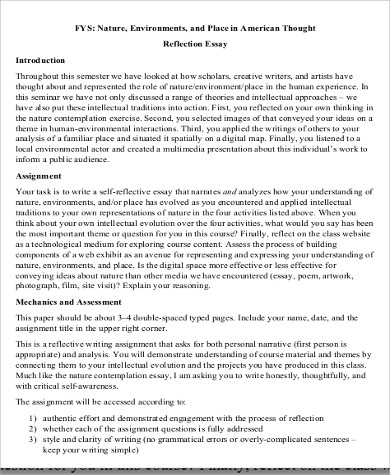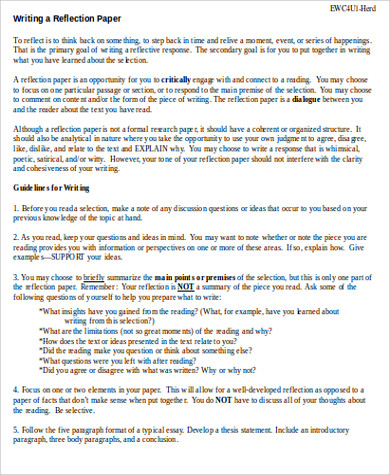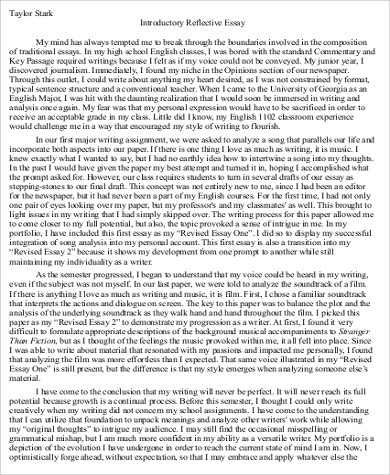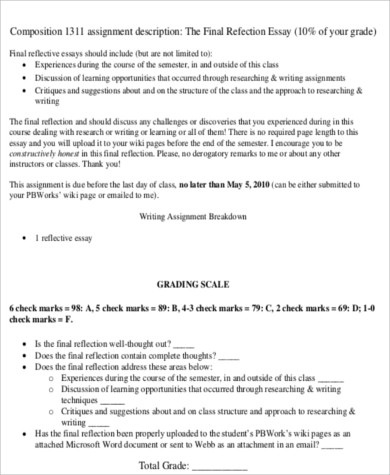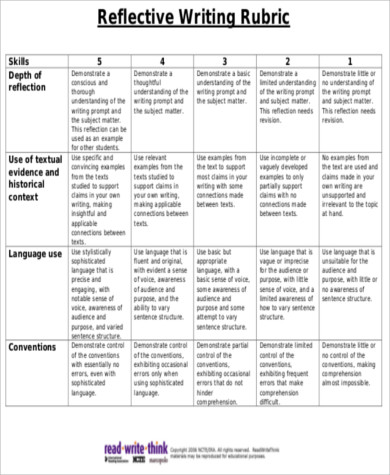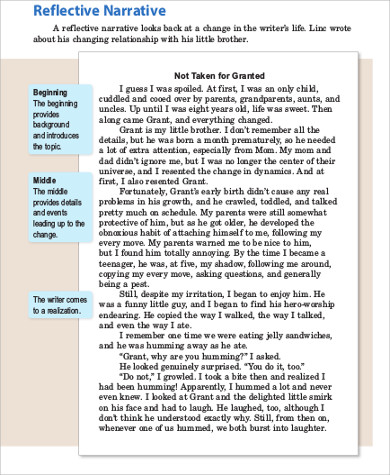Writing a reflective essay is a lot like writing a narrative essay, just with a lot more heart and mind poured into it. Also similar to writing a diary, reflective essays are meant to contain how the writer felt and what the writer learned following an event. It is an intimate piece written with the purpose of sharing the writer’s innermost thoughts, soliloquy, and realizations to strangers who happened to glance at a sample paper where he scratched a couple of words that became phrases, which turned to sentences that became paragraphs.
For guidelines on writing essays, check out the different Sample Essays we have on site.
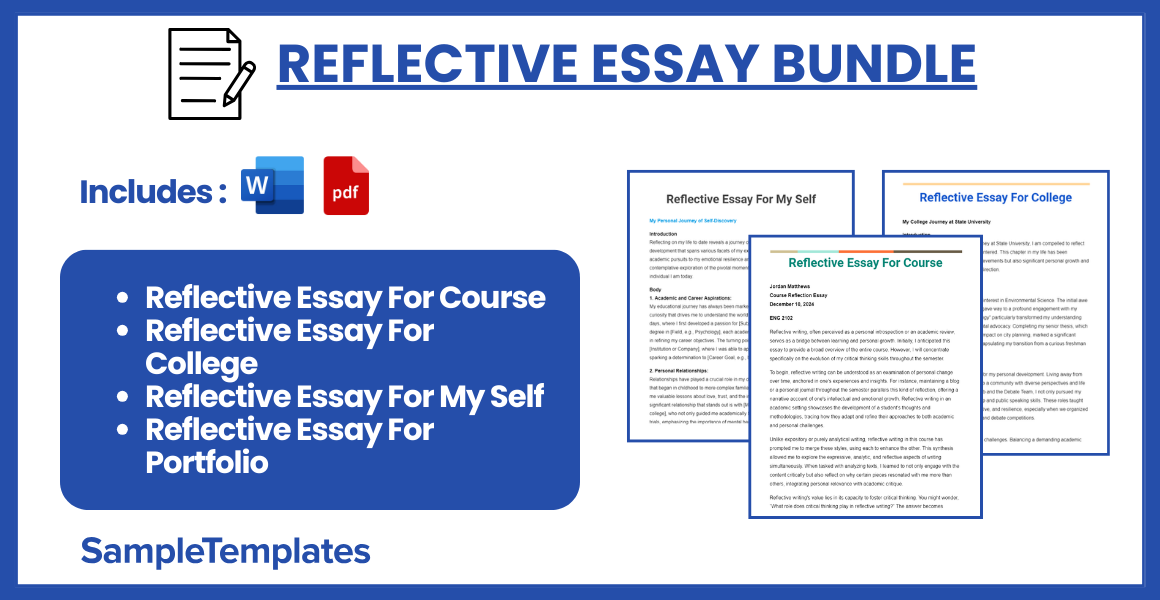
Download Reflective Essay Bundle
Reflective Essay For Course
Jordan Matthews
Course Reflection Essay
December 10, 2024
ENG 2102
Reflective writing, often perceived as a personal introspection or an academic review, serves as a bridge between learning and personal growth. Initially, I anticipated this essay to provide a broad overview of the entire course. However, I will concentrate specifically on the evolution of my critical thinking skills throughout the semester.
To begin, reflective writing can be understood as an examination of personal change over time, anchored in one’s experiences and insights. For instance, maintaining a blog or a personal journal throughout the semester parallels this kind of reflection, offering a narrative account of one’s intellectual and emotional growth. Reflective writing in an academic setting showcases the development of a student’s thoughts and methodologies, tracing how they adapt and refine their approaches to both academic and personal challenges.
Unlike expository or purely analytical writing, reflective writing in this course has prompted me to merge these styles, using each to enhance the other. This synthesis allowed me to explore the expressive, analytic, and reflective aspects of writing simultaneously. When tasked with analyzing texts, I learned to not only engage with the content critically but also reflect on why certain pieces resonated with me more than others, integrating personal relevance with academic critique.
Reflective writing’s value lies in its capacity to foster critical thinking. You might wonder, “What role does critical thinking play in reflective writing?” The answer becomes apparent when assembling the pieces of the essay. A critical thinker sifts through various pieces of information, discerns what is crucial, and determines the best way to convey this in their writing. This process is intrinsic to producing a reflective essay that not only recounts experiences but also offers a cogent analysis of their significance.
In this course, reflective writing has been instrumental in enhancing my self-awareness and critical thinking. It has pushed me to not only recount what I learned but to deeply consider how the material impacted my understanding and perception of broader themes. Each assignment did not just contribute to a grade; it was a stepping stone in the larger architecture of my educational growth.
In conclusion, this course has profoundly shaped my intellectual journey this semester. Through reflective writing, I have not only cataloged my academic progress but also connected it to my broader personal and professional goals. Reflective writing, therefore, is not merely an academic exercise but a vital tool for lifelong learning and personal development.
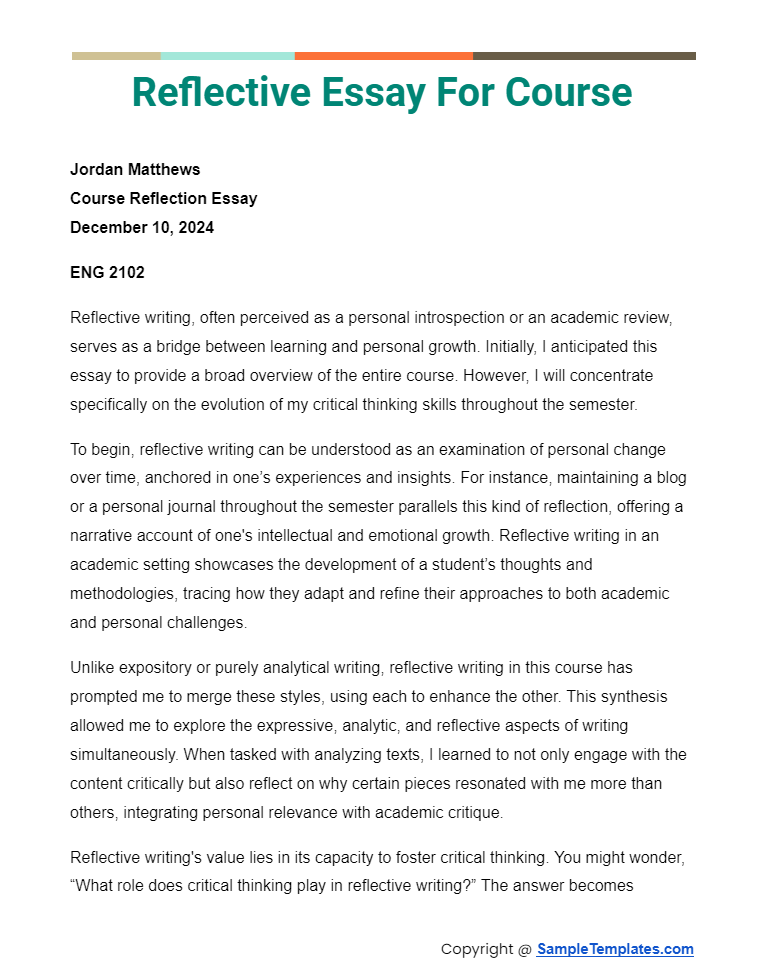
Reflective Essay For College
My College Journey at State University
Introduction
As I near the end of my four-year journey at State University, I am compelled to reflect on the array of experiences I’ve encountered. This chapter in my life has been punctuated not only by academic achievements but also significant personal growth and a clearer understanding of my future direction.
Body
1. Academic Growth:
I entered State University with a keen interest in Environmental Science. The initial awe of the collegiate academic rigor soon gave way to a profound engagement with my major. The course “Conservation Biology” particularly transformed my understanding and fueled my passion for environmental advocacy. Completing my senior thesis, which focused on urban biodiversity and its impact on city planning, marked a significant milestone in my academic career, encapsulating my transition from a curious freshman to a focused, informed senior.
2. Personal Development:
The university campus was a canvas for my personal development. Living away from home for the first time, I was thrust into a community with diverse perspectives and life stories. Joining the Environmental Club and the Debate Team, I not only pursued my passions but also honed my leadership and public speaking skills. These roles taught me the importance of teamwork, initiative, and resilience, especially when we organized campus-wide sustainability initiatives and debate competitions.
3. Overcoming Challenges:
My college journey was not without its challenges. Balancing a demanding academic schedule with club responsibilities and a part-time job was overwhelming at times. During my sophomore year, I faced academic probation due to underperformance, which was a wake-up call. With determination and the support of academic advisors and friends, I improved my time management and study habits, which were pivotal in reversing my academic decline.
4. Planning for the Future:
With graduation looming, I am excited and anxious about the future. My experiences at State University have equipped me with critical skills for the environmental sector. I am now gearing up to apply for a Master’s program in Sustainable Urban Development, aiming to leverage my undergraduate learning to effect real-world change.
Conclusion
Reflecting on my tenure at State University, it is clear that the tapestry of experiences has molded me into a more capable, thoughtful individual. The trials and triumphs of college life have prepared me for the complexities of the real world. I leave the university with not only a diploma but a treasure trove of memories, lessons, and friendships that will guide me through the journey ahead.
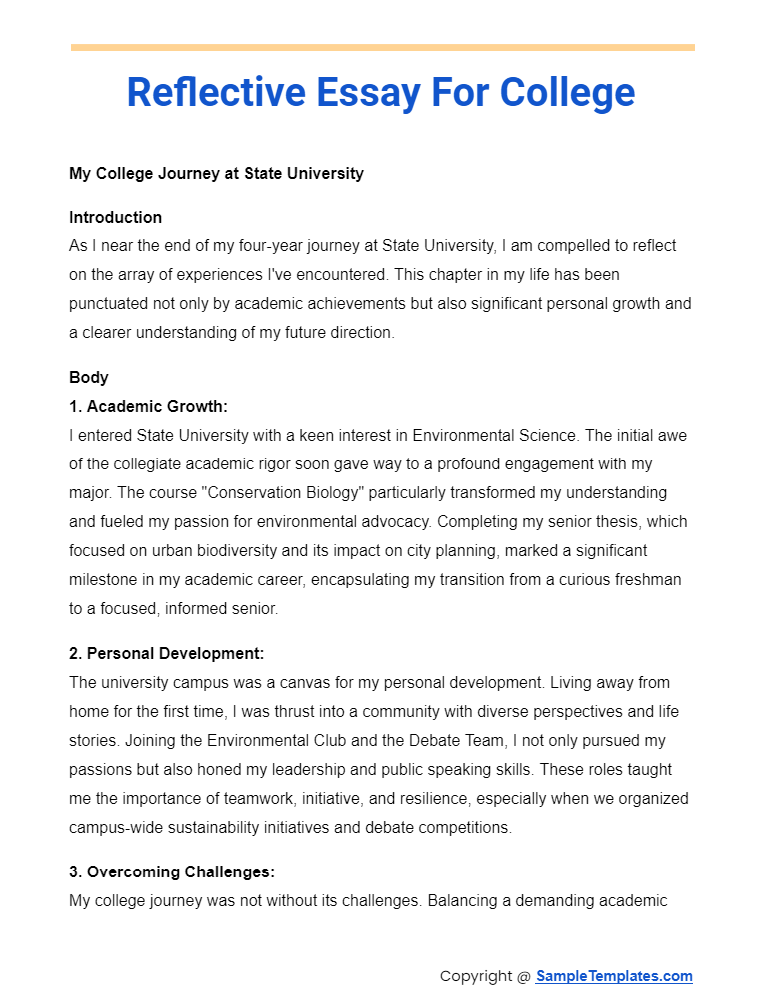
Reflective Essay For My Self
My Personal Journey of Self-Discovery
Introduction
Reflecting on my life to date reveals a journey of self-discovery and personal development that spans various facets of my existence—from my relationships and academic pursuits to my emotional resilience and career goals. This essay serves as a contemplative exploration of the pivotal moments that have shaped me into the individual I am today.
Body
1. Academic and Career Aspirations:
My educational journey has always been marked by a strong desire to excel and a curiosity that drives me to understand the world around me. Starting from my school days, where I first developed a passion for [Subject, e.g., literature], to pursuing my degree in [Field, e.g., Psychology], each academic milestone has been a stepping stone in refining my career objectives. The turning point came during my internship at [Institution or Company], where I was able to apply theoretical knowledge practically, sparking a determination to [Career Goal, e.g., become a clinical psychologist].
2. Personal Relationships:
Relationships have played a crucial role in my development. From cherished friendships that began in childhood to more complex familial dynamics, each relationship has taught me valuable lessons about love, trust, and the importance of clear communication. A significant relationship that stands out is with [Mention a Person, e.g., my mentor during college], who not only guided me academically but also supported me through personal trials, emphasizing the importance of mental health.
3. Overcoming Challenges:
One of the most challenging periods of my life was [Describe a Difficult Time, e.g., battling a chronic illness/overcoming a personal loss]. This experience tested my resilience and forced me to develop coping strategies that have made me stronger. It also instilled a profound appreciation for the fragility of life and the value of health, pushing me to prioritize self-care and encourage others to do the same.
4. Self-Reflection and Growth:
The practice of regular self-reflection has been instrumental in my personal growth. Keeping a journal has allowed me to periodically assess my goals, fears, and accomplishments, facilitating a deeper understanding of my desires and the areas in which I need to grow. This introspective practice has helped mold my responses to life’s challenges and opportunities.
Conclusion
My journey thus far has been both rewarding and enlightening, revealing intrinsic strengths and areas for improvement. As I continue to navigate the complexities of life, the lessons gleaned from past experiences will undoubtedly serve as a guide. Moving forward, I am committed to living authentically, pursuing my passions fearlessly, and embracing the continuous journey of self-discovery with an open heart and mind.
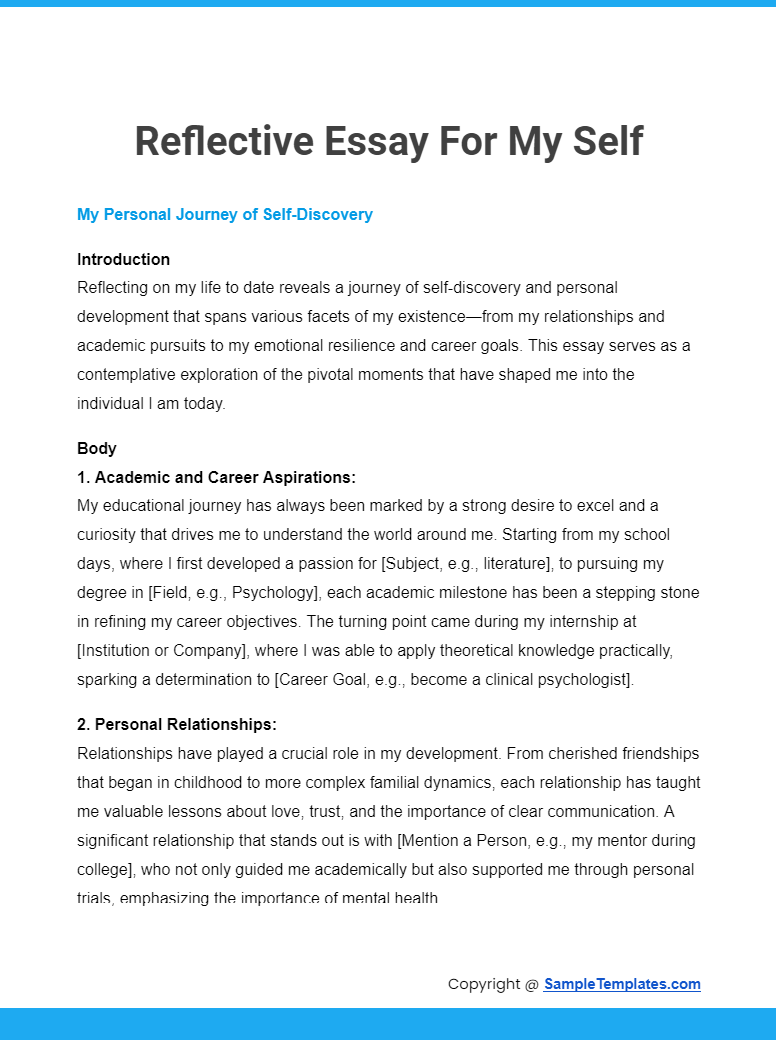
Reflective Essay For Portfolio
Insights from My Portfolio Development
Introduction
Creating my professional portfolio during the final semester at the University of Design has been a profound journey of self-discovery and skill enhancement. This portfolio, which encapsulates my most significant academic projects and internships, not only showcases my technical abilities but also my growth as a designer and thinker. This reflective essay explores the insights gained during the portfolio compilation and the impact of this introspective process on my career outlook.
Body
1. Selection of Works:
Choosing the works to include in my portfolio involved a deep dive into my academic and professional experiences. Each selected piece represents a key learning phase or a breakthrough in my skills. For instance, my project on “Eco-Friendly Housing Designs,” completed during my internship at GreenArch Architects, was a turning point, teaching me the intricacies of sustainable design. This project, along with my senior capstone project on “Innovative Use of Urban Spaces,” forms the core of my portfolio, reflecting my commitment to environmentally conscious design solutions.
2. Skills and Competencies Gained:
The assembly of my portfolio allowed me to map out the evolution of my design skills and the soft skills that accompany my professional growth. For example, redesigning the layout for my project “Urban Space Utilization” enhanced my proficiency in software like Adobe InDesign and SketchUp, also improving my understanding of visual communication and user experience. Critical thinking, organization, and strategic planning emerged as key strengths, particularly as I compiled research findings and design concepts into a coherent presentation format.
3. Challenges Encountered:
One of the main challenges was creating a balance between aesthetic appeal and informational depth. Deciding what to include and exclude required not only introspection but also external feedback. Consulting with my professors and industry mentors, I refined my portfolio to ensure it effectively communicated my expertise and vision without overwhelming the viewer. This feedback was instrumental in selecting works that best represented my versatility and depth as a designer.
4. Professional Identity and Future Directions:
Reflecting on the work I selected and the feedback received, I solidified my professional identity as a designer focused on sustainable urban development. This process clarified my career aspirations, directing me towards seeking positions in firms that prioritize sustainable practices in urban planning and construction. My future goals include further specializing in sustainable technologies and advocating for green design in urban settings.
Conclusion
The creation of my professional portfolio was a transformative experience that extended beyond mere compilation of past works. It has become a narrative of my educational journey and professional evolution, providing clear direction for my future endeavors. As I prepare to graduate and enter the professional world, I am confident that my portfolio will not only help open doors to new opportunities but also serve as a continual reminder of my core values and the impact I aspire to make in the design world.
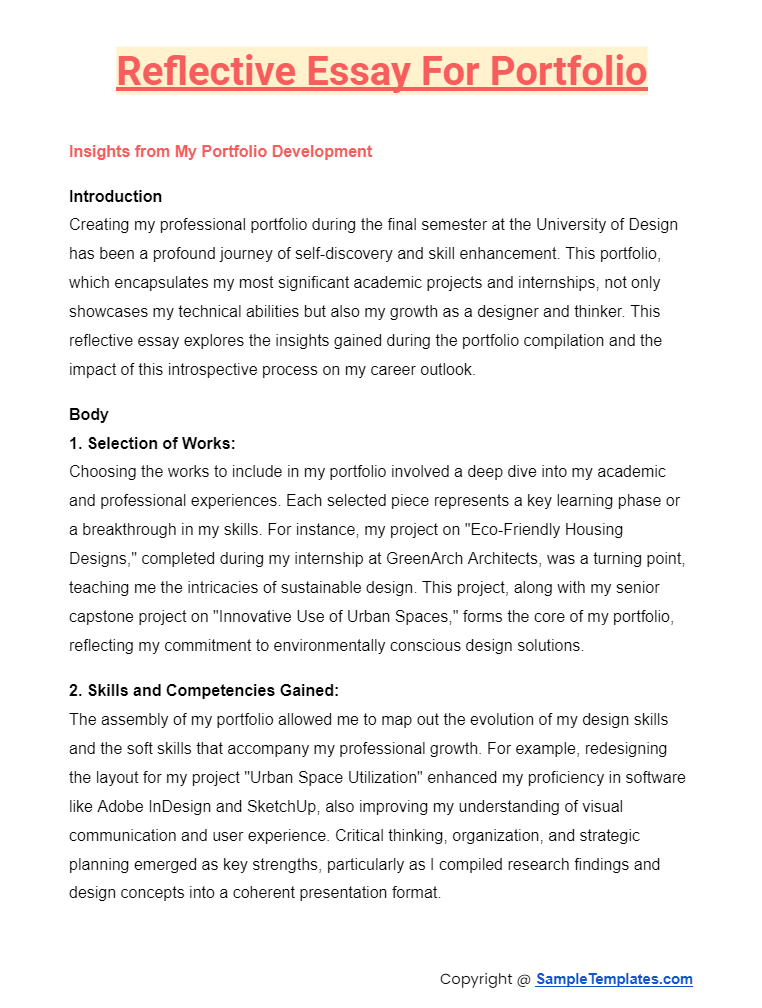
Browse More Templates On Reflective Essay
Reflective Essay Outline Template
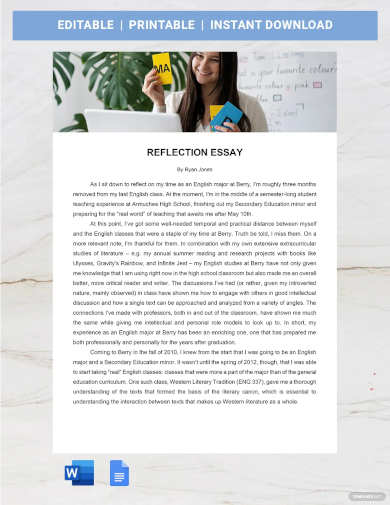
Reflective Essay About Life Experience Template
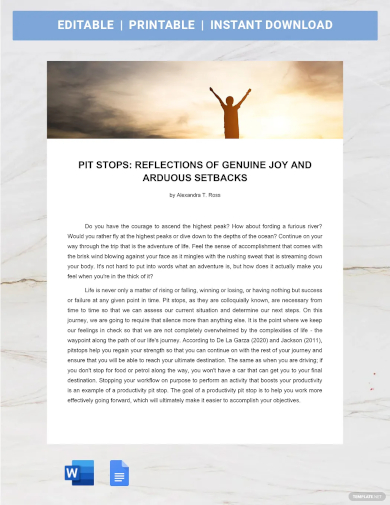
Reflective Essay Template
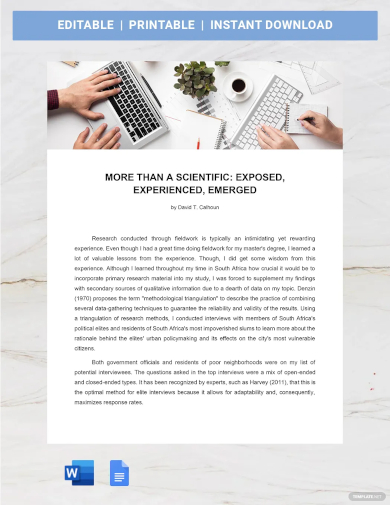
Self Reflective Essay Template
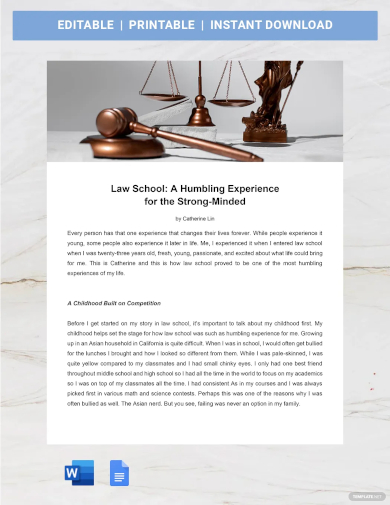
How to Write a Reflective Essay?
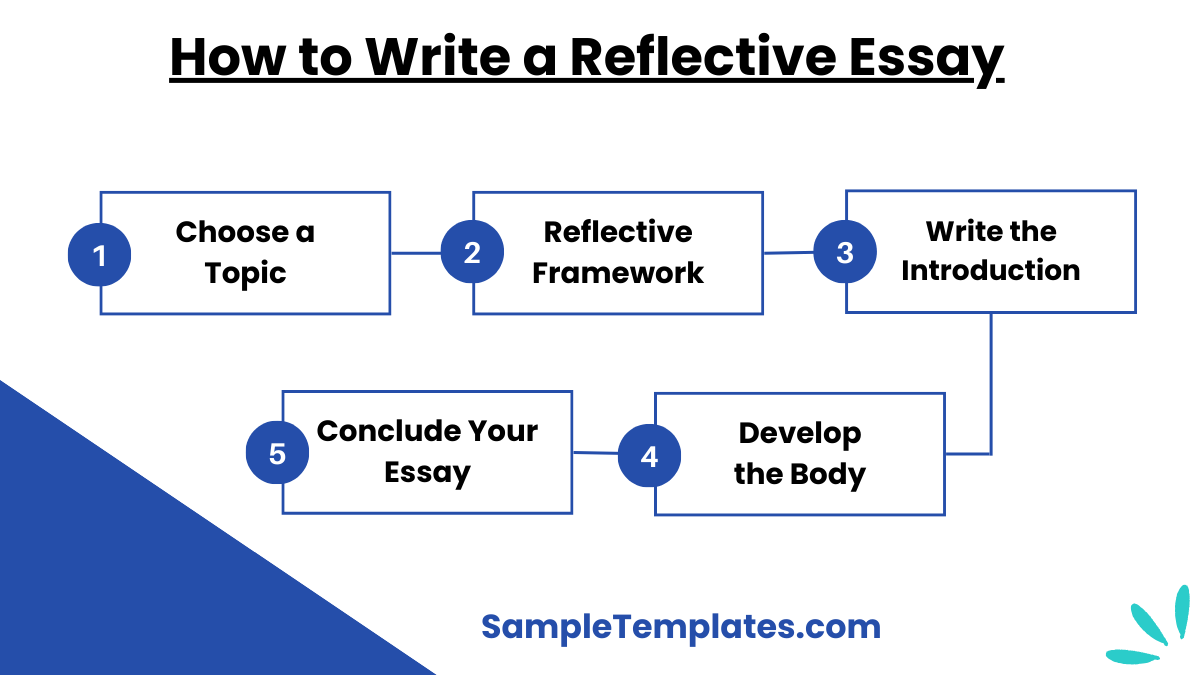
- Choose a Topic: Start by selecting an experience or event to reflect upon. This could be a personal memory, an academic assignment, or a professional challenge. Ensure the topic is meaningful to you and offers depth for reflection.
- Reflective Framework: Use a structured approach such as the Gibbs Reflective Cycle or Kolb’s Learning Cycle to organize your thoughts. These frameworks help structure your essay by breaking down the experience into stages like description, feelings, evaluation, analysis, conclusion, and action plan.
- Write the Introduction: Introduce your topic and provide a brief overview of the experience you will be discussing. Include a thesis statement that outlines the main focus or lesson learned from the experience.
- Develop the Body: Detail the experience and your personal reflections. Discuss what happened, how it affected you, what insights or lessons you gained, and how it contributed to your personal or professional development. Use specific examples to illustrate your points and connect your reflections to broader themes or theories if relevant.
- Conclude Your Essay: Summarize the main insights or changes in understanding that emerged from your reflection. Discuss any future implications or actions you plan to take based on the lessons learned. The conclusion should bring closure to your reflective journey and underscore the personal significance of the experience. You can also see more on Reflective Writing.
Sample Personal Reflective Essay Template
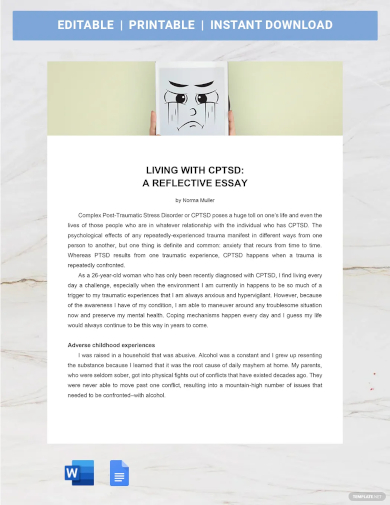
University Reflective Essay Template
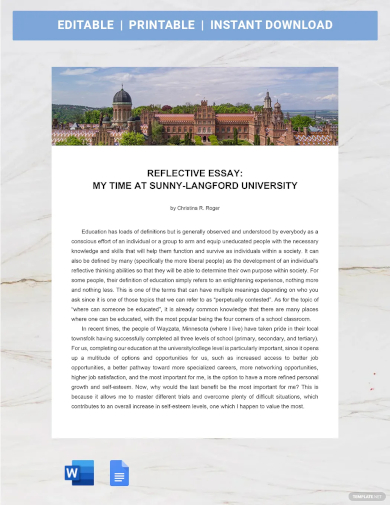
Critical Reflective Essay Template
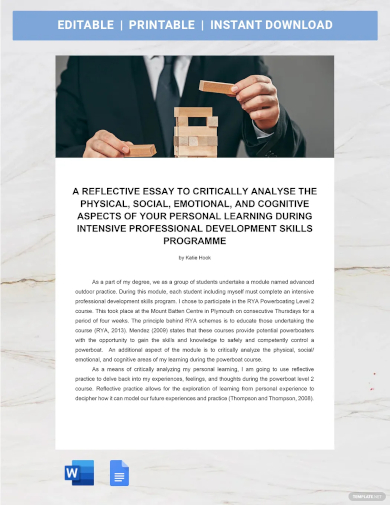
Nursing Reflective Essay Template
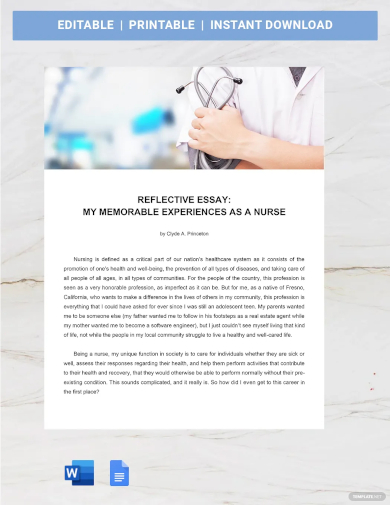
Uses of Reflective Essays
- Self-awareness Development:
- Reflective essays encourage writers to think deeply about their actions, choices, and experiences, which enhances self-awareness and promotes personal growth. You can also see more on Personal Essay.
- Enhanced Critical Thinking:
- Writing reflective essays requires the analysis of events and understanding their implications, fostering critical thinking skills and encouraging users to evaluate situations from multiple perspectives.
- Improvement of Writing Skills:
- The process of writing a reflective essay helps improve writing skills as it requires clear articulation of thoughts and feelings, which can refine one’s ability to express ideas coherently.
- Integration of Theory and Practice:
- In educational settings, reflective essays help students connect theoretical knowledge from their coursework with practical experiences, often observed during internships or real-world applications.
- Professional Development:
- Professionals use reflective essays to contemplate their roles, challenges, and successes within their careers, which can inform future decisions and strategies in their professional lives. You can also see more on Evaluation Essay.
- Problem Solving:
- By reflecting on past experiences, individuals can identify effective and ineffective strategies and decisions, which aids in developing better problem-solving skills for future challenges.
- Emotional Intelligence:
- Reflective essays require introspection about emotional responses and interactions, which can enhance emotional intelligence by making writers more aware of how they handle their emotions and react to different situations.
- Documentation of Learning and Growth:
- Reflective essays serve as a record of personal and academic growth over time. They can be revisited to observe changes and improvements in one’s attitudes, skills, and knowledge. You can also see more on Self-Assessment Essay.
Student Reflective Essay Template
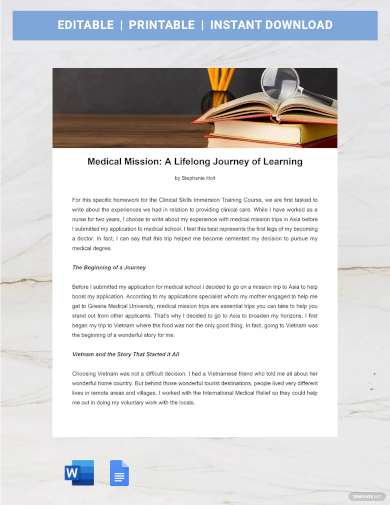
Free Reflective Essay Example
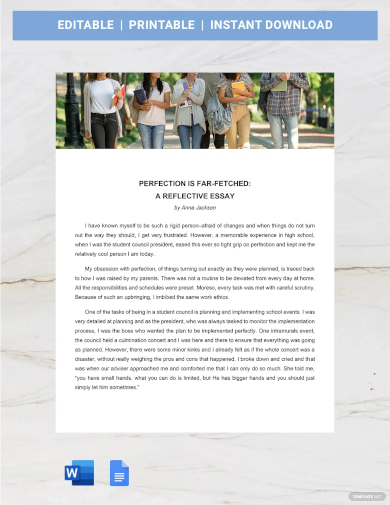
Self Reflective Essay Template
Sample Reflective Writing Essay in PDF
Personal Reflective Essay Template
Reflective Essay on Nature Template
Sample Reflective Essay Paper Format
Reflective Essays
In a nutshell, reflective essay writing help us think and discover more about the inner workings of our minds. We write it to examine our experiences in life, explore how we’ve changed, developed, and grown from those experiences.
Unlike Analysis Essay Samples, formats of a reflective essay would depend mainly on who the audience is and the preference of the writer. However, like all essays, reflective essays have three main components:
- an introduction where we find the essay’s main idea or overall reflection;
- a body, where the major points and evidences that support the main idea lie; and
- a conclusion that wraps up the points of the writer.
Upon close inspection of the Personal Essay Examples we have on the site, you may notice that there are no significant differences between these and a reflective essay. One main difference would simply be that a personal essay need not be a reflection of the author on their experiences but may be about anything.
Introductory Reflective Essay Template
Sample Final Reflective Essay Example
Tips For Writing a Reflective Essay
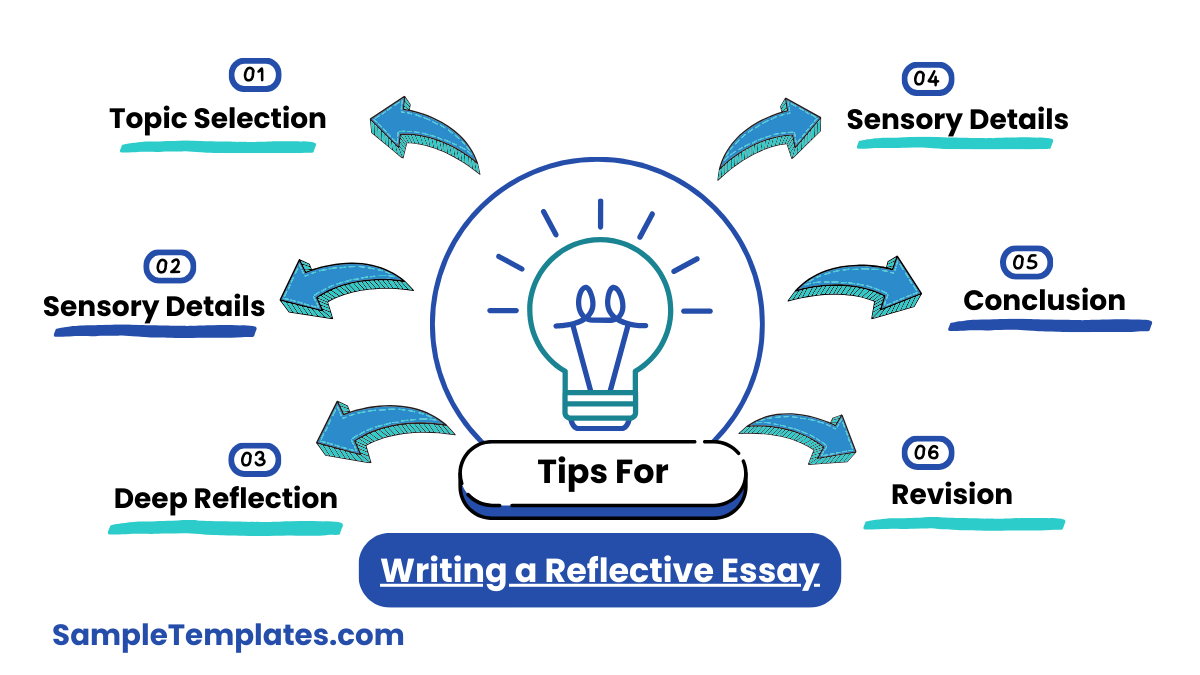
- Choose a Meaningful Topic:
- Select a topic that has personal significance or that has had a profound impact on you. This could be an event, a person, a conversation, or even a period in your life.
- Use the First-Person Narrative:
- Since reflective essays are personal, write in the first person to describe your experiences and feelings. This approach makes your writing more authentic and engaging. You can also see more on School Essay.
- Create a Strong Introduction:
- Begin with an attention-grabbing introduction that hints at the reflective theme of your essay. You might start with a question, a quote, or a vivid description of the scene or moment you’re reflecting on.
- Detail Your Experience:
- Clearly describe the experience or event. Provide enough background information so that readers understand the context and why this reflection is significant to you.
- Reflect, Don’t Just Recap:
- Go beyond merely describing the event. Analyze and interpret what happened, how it affected you, what you learned, and why it matters. This is the core of your reflective essay. You can also see more on Student Essay.
- Incorporate Feelings and Sensory Details:
- Express how you felt during the experience and what tangible sights, sounds, or smells you associate with the event. These details can help the reader empathize with your personal journey.
- Draw a Conclusion:
- Summarize your learning or the new understanding you gained through this experience. Reflect on how this insight changes your perspective on the issue or affects your future behavior.
- Proofread and Revise:
- After writing your first draft, take some time to revise and refine your essay. Look for clarity in your writing, check the flow of your narrative, and ensure your reflective insights are clearly expressed. Proofreading for grammar and spelling errors is also crucial. You can also see more on Academic Essay.
Sample Reflective Essay Rubric Template
Reflective Narrative Essay Template
Basic Reflective Essay Outline Template
Purpose of Reflective Essays
Writing essays can teach the writer how to translate their intangible feelings and thoughts into words that could make a difference to the world around them. Reflective essays are written for many reasons. Among those are the following:
- Provide psychological healing. Writing about a pain you’re experiencing or reading about someone going through a similar situation sometimes help set things in perspective. It might also give you the motivation and hope that you are looking for.
- Creates a sense of oneness. Sharing an experience with others gives you a feeling of shared history. It gives people a sense of brotherhood and connection.
Characteristics of a Reflective Essay
While different experiences yield to essays with different contents, reflective essays are all similar to each other in the sense that they all:
- Show a development, growth, or change. A reflective essay is written to show how a situation changed the perspective or thought process of the author. It shows how the author evolved after their experiences.
- Have a point that it is trying to communicate. A reflective essay format isn’t written just because it’s such a fun pastime. These essays have a point to make, a wisdom to impart, or perhaps even comes with a warning. Either way, a good reflective essay would be one where the reader, after finishing it, would stop for a while and take it all in.
Reflective essays are personal pieces of the writer that they have translated into words. It takes a lot of guts to do something so brave.
For more types of essays, also see the Descriptive Essay Samples we have on site.
How to start a critical reflective essay?
Begin with a compelling hook: pose a thought-provoking question, cite a relevant quote, or describe a powerful scene to set the reflective tone.
Is a reflective essay first person?
Yes, reflective essays are typically written in the first person to offer a personal perspective and connect deeply with the reader.
What to avoid in reflective writing?
Avoid generic descriptions and superficial reflections. Steer clear of clichés, overly casual language, and unfocused rambling.
Does a reflective essay have a title?
Yes, a reflective essay should have a descriptive and engaging title that hints at the essay’s focus and tone.
Can you refer to yourself in a reflective essay?
Yes, you can and should refer to yourself in a reflective essay, as it is personal and introspective, centering around your experiences and insights.
Related Posts
FREE 10+ Essay Introduction Samples in PDF
FREE 6+ Essay Organizer Samples in PDF | MS Word | Google Docs
FREE 10+ 5 Paragraph Essay Samples in PDF | MS Word | Apple Pages
FREE 10+ Argument Essay Samples in MS Word | Google Docs | PDF
FREE 10+ Research Essay Outline Samples in PDF | MS Word | Apple Pages
FREE 10+ Templates for Persuasive Essay Samples in PDF
FREE 10+ Essay Conclusion Samples in PDF
FREE 4+ MLA Format Essay Samples in PDF
FREE 10+ Leadership Essay Samples in MS Word | PDF
FREE 10+ Narrative Essay Outline Samples in PDF | MS Word | Google Docs
FREE 10+ APA Essay Samples in MS Word | Google Docs | PDF
FREE 10+ Research Paper Essay Samples in MS Word | Google Docs | PDF
FREE 8+ Sample Narrative Essay Templates in MS Word | PDF
FREE 10+ Community College Essay Samples [ Service, Builder, Transfer ]
FREE 10+ Admission Essay Samples [ College, Graduate, Nursing ]
